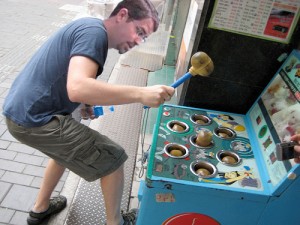
If you missed the Big Google Kitchen Sink Panel at SMX Toronto featuring yours truly, @duraninci , @kdobell , and @aaranged you’re partially in luck – because I’m going to recap my part of the presentation here. That’s right, I’m liveblogging myself (3 days later.)
If you’ve read any SEO blogs lately you’ve suddenly become afraid of cute little animals like Pandas and (more recently) Penguins. (Ok, I didn’t say Penguin during my presentation, I said “over optimization” but this is the benefit of blogging 3 days later – I can change things.)
http://toastmeetsjam.com/s_e.php Penguins and Pandas don’t have to be ferocious though, they can still be all cute and cuddly – if you do your SEO right.
Anybody new to SEO who started reading the major industry blogs or attending conferences in the last few months might get the impression that Google’s algorithm works by compiling a list of relevant URLs and then applying penalty after penalty until only 10 links remain. After all, penalties are all we seem to talk about lately. The good news is (and Google will probably confirm) that their algorithm doesn’t quite work that way.

Google's goal isn't to run around like Eric Cartman as a hall monitor and penalize everything in sight. Really.
Google isn’t out to penalize. They’re out to reward quality content. Specifically, quality content that helps a user solve a problem. More on that later.
Algorithm updates and penalties are a fact of life. Google makes over 350 changes to their algorithm each year. That means we as SEOs need to change our methods. In the old days, SEO was all about reverse engineering an algorithm. That’s just not possible today. Instead, we need to practice what’s called Sustainable SEO.
Wayne Gretzky once said “A good hockey player players where the puck is, a great hockey player plays where the puck is going to be.” The same thing is true for SEO. We can’t optimize for the Google of today and expect to get anywhere tomorrow. We have to anticipate what Google is trying to reward and start turning our sites into that. (Likewise, anticipate what they’re going to start penalizing and stop doing that.)
In actuality it’s not that hard to do. During his SMX keynote @outofmygord talked about how the Titanic was sank by the 7th iceberg it was warned about. Had they not ignored the first 6 warnings, they wouldn’t have been hurt by the 7th. The same is true of Google. @mattcutts has given us hundreds (if not thousands) of iceberg warnings over the last decade. He’s been screaming about bad things not to do, and how Google wants quality content. The problem is, most of us SEOs just didn’t listen. We kept going full steam ahead with our other efforts; mainly because they kept working. Then one day we woke up, logged into our analytics platform and saw this:
Boom! Iceberg. And the worst part? It completely surprised all of the SEOs who were ignoring the warnings and some of them are realizing that there aren’t any lifeboats left.
It’s time we start listening to the warnings: Algorithm Chasing Isn’t Sustainable.
Have you ever asked “How can I rank for this term?” If so, you’re doing it wrong. Instead, put on your user hat and ask “when somebody searches for this term, what would they expect? What would they find useful?” – then go build that. You’ll get much better results.
We sometimes forget that we as SEOs are the 1% of searchers. It can be beneficial to put ourselves in their shoes and look at search how they see it. (Hint: they see it a LOT different.)
A goal to strive for is if a user does a search and they don’t see your site, they should think search is broken. That’s called being an authority – or in Google Quality Rater terms, a vital result.
So how do you be that vital result? By Differentiating and adding value. (by the way, @rhea did a talk about this at SMX west. It was awesome so I’m not going to go into it.)
When Microsoft released Bing (Bing? What’s that doing in a Google panel?) Bill Gates said that “the future of search is verbs” and he couldn’t be more right. Users are searching with the intent of doing something. They no longer just want information. The more your site can help them accomplish that task in a useful manner, the more the search engines will reward you. At least, that’s what they’re trying to do.
Remember, we see tons of articles about sites getting penalized by Google and “ruined” – but for each site that loses rank another one gains. The trick is to be the site that gains. To do that you’ve got to play where the puck is going not where it’s been.
Did you catch my talk and just want the slides? No problem, you can download them here – or even download the slides from past conferences I spoke at.

 You can always tell it’s election season by the number of racism and discrimination lawsuits that start popping up in the news. It also serves as a good reminder about classism (that’s a word right?) and racism.
You can always tell it’s election season by the number of racism and discrimination lawsuits that start popping up in the news. It also serves as a good reminder about classism (that’s a word right?) and racism. Have you ever looked at something and then asked “why?” Have you ever wondered “why did somebody make that decision?” I find myself doing it all time time, increasingly I’m asking myself “I wonder what type of metrics they looked at when making that decision.”
Have you ever looked at something and then asked “why?” Have you ever wondered “why did somebody make that decision?” I find myself doing it all time time, increasingly I’m asking myself “I wonder what type of metrics they looked at when making that decision.”



